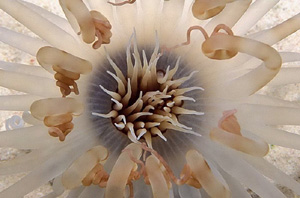

 Online Scuba Lessons |
 Online Nitrox Lessons |



The Scuba Gear Blues
First and foremost is storage. Do you carry your delicate masks and regulators around in a pillowcase, or an old shoe box? Sure it gets you from point A to B, but will you have to sit out the dive because something broke? A good sized gear bag will help transport your gear in style, and be relatively water resistant on those long weekends aboard the boat. A regulator bag, priced around $35, is cheap insurance too, for equipment you spent hundreds on, and not to mention will be depending on for the mere act of breathing underwater! A mask box is a nice addition too, if your mask didn't come with one.
In every gear bag you should carry some lens cleaner and defogger – they come in several brands and sizes and most work, but some work better than others do. Spit works in a pinch, but GEEEZ! If you got something in your eye, would you spit in IT?
Likewise, there are cleaners for your BC. Did you realize that water sometimes gets inside the BC bladder? And did you know that water STINKS after a couple of days? Always dump any excess water out, and give a fresh water rinse with a cleaner designed for this purpose, it wont hurt the bladder material and will guard against any nasties growing in there! To dump the water, turn the BC upside down, and hang from the tank strap on a sturdy hanger. Turn the vest so that all water can drain toward the hose. Now just depress the air dump button and the water will run out. You may have to do this a few times, alternately squeezing and turning the BC to get it all out. Pay attention to rinsing all those buttons very carefully- it is no fun if one should stick on you underwater and they usually only stick because they haven't been properly maintained.
Your wet suit can fall victim to the same stinky dilemma, so we carry a wet suit stink remover called SMELL GUARD. And, we all know that you pee in your wet suit. What the hell, I do too! So, some sort of smell guard deodorizer, especially after you’ve rinsed the suit out at the dive site and are packing it away for the long ride home. You'll be glad you did!
Clean all of your gear, even the plastics, with lots and lots of fresh water after EVERY trip. Water has lots of cute little organisms in it that hide in the cracks of your gear, and when you put your gear in that closet for a week or month or year, they have big parties, and multiply. Salt water is the most corrosive substance on earth, but its slow acting. Left unchecked it will eat away at your gear – and at your wallet. Not to mention your fun. Get rid of it. Salt water is for the ocean only!
Be sure to secure that little rubber cap that came with your first stage before rinsing. Water is not meant to enter that little opening, nor is dirt. Check the screen and have it replaced if its dirty or shows signs of corrosion. If there is corrosion, tell us. It may mean your hoses got water inside, and you may need to have them serviced. A dust cover or mouthpiece cover is nice to have for between dive storage and even for use on your octopus underwater, so sand can’t enter.
Rinse your booties out well, paying attention to the zippers. Work the zippers up and down as you rinse. Don’t leave the zipper tab at the very bottom or very top, where the little metal stays are located – if any corrosion should take place it will weld the zipper to the stays and you may be buying a new pair of booties.
Last but not least, invest in a bottle of silicone spray that is made expressly for dive gear. It inhibits rust, lubricates zippers, and helps silicone parts retain their suppleness for years. Your dive knife may require an actual rust block, which is also made in spray form.
Make sue your tank has some air left in it before storing it (at least 500lbs) and do have it visually inspected yearly. Not only will you need to do that to have it filled, but we spot any signs of water having entered the tank and clean it up for you before it becomes too damaged to use. Get a rubber cap for the valve to protect it form dirt and heat during storage. Don’t store your tanks where they’ll be subject to extreme heat, or can be knocked over.
Doing these things after every dive, properly storing your gear, and investing less than 20 bucks in sprays, will prolong the life of your gear, and allow it to perform the way it was designed. Combined with your annual checkups, it will keep you smilin’ and divin’ for a very long happy time.
Let’s go down together…
Bwana
![]()

Aquastrophics Dive & Travel
(928) 680 - DIVE (3483)